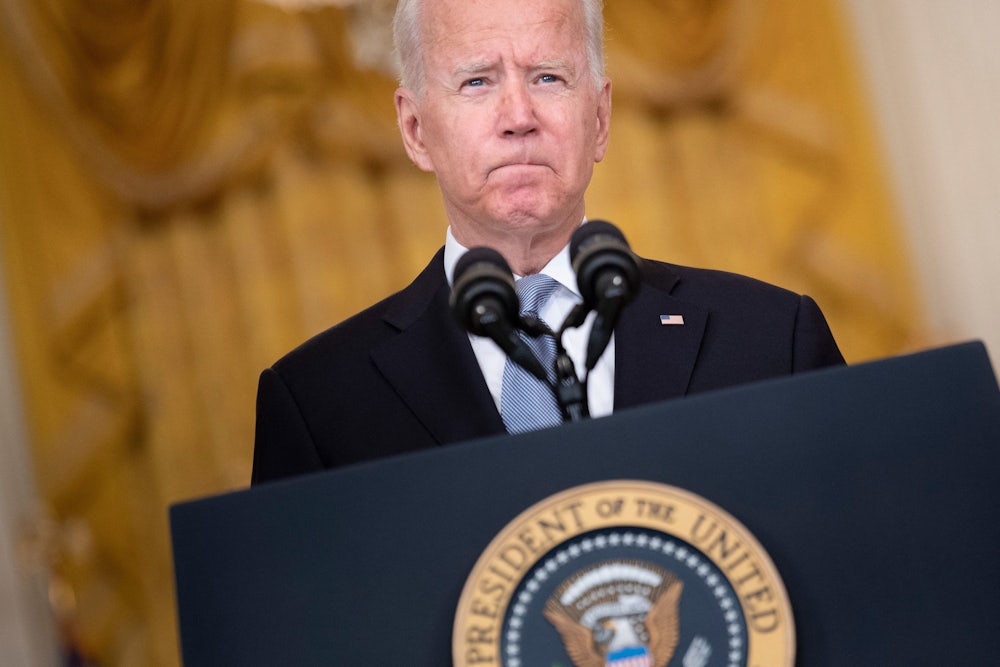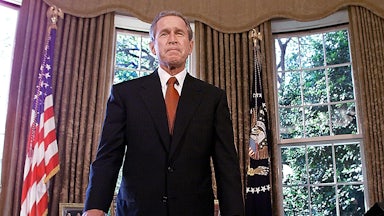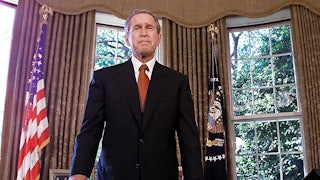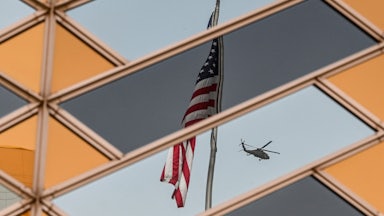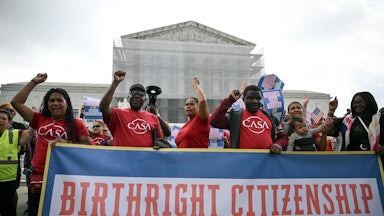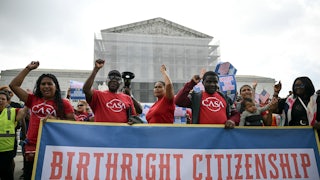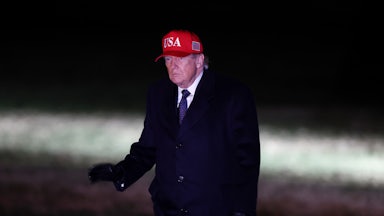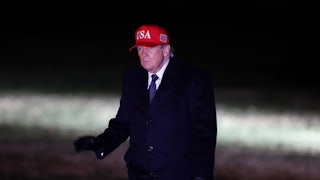Joe Biden delivered Monday’s speech with grim determination as he tried to take—and deflect—responsibility for the greatest American military debacle since the fall of Saigon.
The tone Biden aspired to was pure Harry Truman as the president even used the old Truman catchphrase, “The buck stops with me.” There was no backsliding by Biden in his resolve to withdraw from Afghanistan; as he said near the beginning of the speech, “I stand squarely behind my decision.”
But if Truman provided the melody, the words were those that no Democratic president—not even Barack Obama—had uttered since before the dawn of the Cold War. Beginning with Harry Truman and carrying through John Kennedy and beyond, Democratic presidents were liberal cold warriors, rhetorically willing “to bear any burden” to defeat communism. For Bill Clinton and Obama, the prevailing doctrine morphed into a combination of belated humanitarian intervention and a timorous tendency to defer to the generals. But Biden, in contrast, stressed that American military power has acute limits—and Goliath is out of the nation-building game.
Indeed, the underlying theme of Biden’s remarks was that the long era of American entanglement in the internal affairs of other countries had come to an abrupt and humiliating end. Invoking his own eight years as Obama’s vice president, Biden said bluntly, “I’ve argued for many years that our mission should be narrowly focused on counterterrorism—and not counterinsurgency or nation-building.” And then he added a line that he used during the 2020 Democratic primary debates to differentiate himself from Obama: “I opposed the surge when it was proposed in 2009, when I was vice president.”
The strongest—and weakest—aspects of Biden’s speech were the words and arguments that weren’t in it.
There was none of the false bravado that Kennedy displayed in December 1962 when he greeted the returned captives from Brigade 2506’s abortive Bay of Pigs invasion of Cuba. In a ceremony at the Orange Bowl in Miami, JFK was presented with the brigade’s battle flag. And Kennedy responded with the appropriately over-the-top Cold War boilerplate, “I can assure you that this flag will be returned to this brigade in a free Havana.”
In April 1975, just a few days before Saigon fell to the North Vietnamese, Jerry Ford tried to put a patriotic spin on America’s abject defeat in a speech at Tulane University in New Orleans. Ford invoked the 1815 Battle of New Orleans and quoted Abraham Lincoln as he talked about the need “to regain the sense of pride that existed before Vietnam.”
Biden, to his credit, avoided such rhetorical tricks. The GOP’s sound-bite chorus of neoconservatives and political opportunists will undoubtedly fault the president for not devoting the bulk of the speech to lionizing the American fallen in Afghanistan. But, in truth, Biden praised the American military and ended his solemn remarks with a revised coda, “May God protect our troops, our diplomats, and all brave Americans serving in harm’s way.”
Unfortunately, what was also missing from Biden’s speech was an honest explanation of the colossal intelligence failure that left the White House reeling from the speed of the Taliban’s triumph. There was no admission of American strategic misjudgment beyond Biden’s weaselly worded admission, “The truth is, this did unfold more quickly than we had anticipated.”
Then Biden indulged himself with a litany of well-justified complaints about the rush-for-the-exits Afghan government. As the president put it, “Afghanistan political leaders gave up and fled the country. The Afghan military collapsed, sometimes without trying to fight.”
All true, but insufficient. Amid the thousands (maybe millions) of secret documents destroyed in the panicked last hours of the American embassy in Kabul were undoubtedly endless upbeat and nuanced assessments of the capabilities of Afghan fighting forces. In all likelihood, there were memos galore about which Afghan political figures would step forward as national heroes in a moment of crisis.
But just as the CIA and all the other expensively intrusive U.S. spy agencies missed the collapse of the Soviet Union, so did America’s intelligence community blunder again over the pace of the fall of Kabul. There will be many self-serving explanations by intelligence agencies that such a total collapse was indeed a possible scenario included in all memos to the president. But, if that were the case, Biden (no amateur when it comes to reading CIA reports) would never have uttered such cringeworthy lines in July as, “There’s going to be no circumstance where you see people being lifted off the roof of an embassy of the United States in Afghanistan.”
In the days ahead, the desperation deployment of 6,000 American military forces to Kabul may belatedly organize a much more orderly finale to the nation’s longest war. While nothing can repair the damage from the chaos—and, yes, callousness—of the last week, a sustained drive to evacuate all the Afghans who worked for Americans in Kabul, plus all the beleaguered journalists and humanitarian workers, might salvage a smidge of national honor.
There is an irresistible temptation in American political life to look at every event through the prism of “who won the week.” But even more than the Senate infrastructure bill, the humiliating defeat in Afghanistan was a bipartisan endeavor. Every president since 2001, including Obama, deserves an ample share of blame. But at a point when the American mood of isolationism rivals that of the 1920s, it is hard to see swing voters sustaining political outrage over the embarrassing last days in Kabul. Before America votes in 2022, so many other domestic issues (especially the pandemic) will move to the center of the political debate.
History has never been fair. In poetic terms, it would have been far more appropriate if Lyndon Johnson or Richard Nixon had been in the White House for the fall of Saigon. But Jerry Ford drew the short straw—and it will always be associated with his presidency.
Joe Biden, unlike most political figures, entered the White House as a full citizen of the Republic of Suffering for all the devastating personal losses (the death of his first wife, Neilia, his infant daughter, Amy, and, of course, his beloved son Beau) that he has endured over the decades. What that means is the worst day for Biden in the White House will never come close to being the worst day of his life.
That is why Biden presumably has the inner resources to weather this sad-eyed finale of the American entanglement in Afghanistan without indulging in endless why-me self-pity. Monday’s speech, despite its glossing over of the intelligence failures, was an honest attempt to reckon with the magnitude of the disaster that accompanies the uniquely American folly of nation-building.
